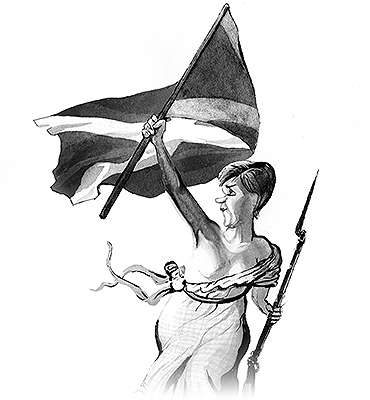Is the word of a Scottish government minister worth anything? The question arises in the wake of the SNP’s Hate Crime Act which, among much else, creates the offence of ‘stirring up hatred’ against ‘transgender identity’. Feminist groups warned early on that the Bill’s language could see people who don’t believe that men can become women (or vice versa) prosecuted for what had hitherto been treated in law as legitimate expression.
Prominent among these groups was MurrayBlackburnMackenzie (MBM), a policy analysis outfit whose principals boast extensive scholarship and years of experience inside the civil service. One of MBM’s principals, Lucy Hunter Blackburn, gave evidence to the Holyrood justice committee in February 2021 citing the ‘numerous ways in which, and examples of where, accusations of hate and abuse have been directed at women taking part in the debates around sex and gender identity’.
On the same day and before the same committee, the then Scottish government justice secretary Humza Yousaf said he was ‘making an offer to those who would like to see more specific detail in the bill’ that he would ‘continue to engage with stakeholders and members of the committee’. Yousaf proposed ‘that I engage with stakeholders to see where we might be able to give them some reassurance in the explanatory notes that sit alongside the bill’. He even dangled the possibility that ‘we might need to insert some more specific examples – perhaps some of the examples that Lucy Hunter Blackburn mentions about the belief of some people that sex is immutable and that people cannot transition from male to female and vice versa’.
Yousaf told the committee:
I am confident that we will get to a position where we can get a freedom of expression provision that gives people the confidence that they need on the bill’s impact on free speech and freedom of expression and at the same time ensures that we are not giving a green light to any type of behaviours that I suspect that none of us would like to see happening to protected groups.
No sliver of comfort to be taken here, no reason to be cheerful
As anyone who has been following this debate knows, the Hate Crime Bill somehow withstood the fierce legislative scrutiny of the Scottish parliament and became the Hate Crime Act. Now the explanatory notes are out and, according to MBM, ‘simply restate the provisions in the Act and provide no detail in relation to freedom of expression around sex and gender identity, nor any examples, as the cabinet secretary suggested might be considered’. In other words, all of Yousaf’s pretty words about protecting freedom of speech were just that and nothing more.
MBM levels another, even more serious charge:
Despite the assurance made to the committee by the cabinet secretary and followed up to us in writing, the Scottish government did not engage with us at any stage. A promise was clearly made to the committee that has not been kept.
In response, the Scottish government tells me its ‘position in respect of the freedom of expression provision was laid out clearly and debated extensively before parliament voted by a significant majority to add the freedom of expression provision into the legislation’. A spokesperson also pointed to a February 2021 justice committee roundtable session at which the justice secretary and MBM were both present.
None of this is terribly surprising. What it underscores are the hallmarks of governing and legislating in the SNP era: ideology-first, evidence-whenever policymaking; undisguised executive contempt for the legislature; and a complicated relationship between Scottish ministers and the truth. Legislation is cooked up via consultation with favoured lobby groups, often lobby groups directly funded by the Scottish government, and from there it’s simply a question of how long it will take the political steamroller to impress the First Minister’s current, faddish preferences onto the statute books.
Don’t look to Holyrood committees for help. Conveners are directly appointed by the whips and it shows. Don’t expect problems to be addressed in the chamber. Unlike Westminster, where governments of either party have to contend with independent-minded backbenchers, the SNP group at Holyrood functions essentially as a bloc vote, with challenging questions about government legislation uncommon and Nationalist backbenchers voting against ministers almost unheard of. Holyrood isn’t a parliament: it’s a 129-seat rubber stamp.
There’s no sliver of comfort to be taken here, no reason to be cheerful. As long as a dysfunctional political system continues to enjoy the power to legislate it will continue to legislate dysfunctionally. Whether it’s the new Gender Recognition Reform Bill (removing medical experts from the gender-recognition process in favour of ‘self-identification’) or the Coronavirus (Recovery and Reform) Bill (giving the Scottish government permanent pandemic-style powers without parliamentary approval), the remaining uncompromised parts of civil society must strain to cause enough of a stir to win meaningful legislative concessions from ministers. That is becoming more difficult thanks to the SNP-Green government’s overall majority, the lack of substantive checks and balances, and the ever-quietening voice of Civic Scotland.
If your interest is in thorough, rational policymaking or legislating that does more good than harm, it’s near impossible to win in this system. It’s getting more and more difficult just to get a fair hearing. This raises some difficult questions. Is it worth the time, effort, financial outlay and hassle to engage with a Scottish government consultation? Is there anything to be gained from giving evidence to a feeble Scottish parliament committee? Does going through the motions not confer legitimacy on a flawed system?
Most difficult of all: Might the only hope for better governing and better legislating in Scotland be for critics and scrutineers to withdraw their labour and show up the system for what it is?







Comments